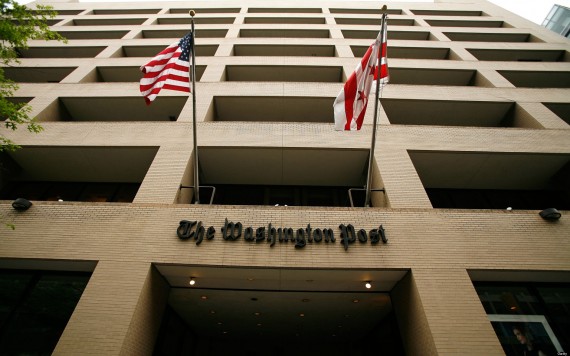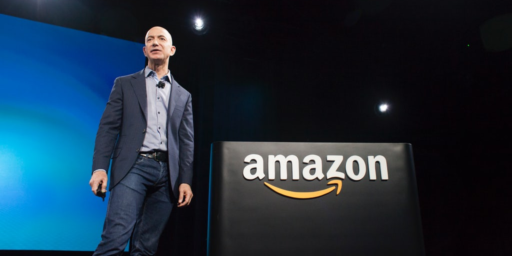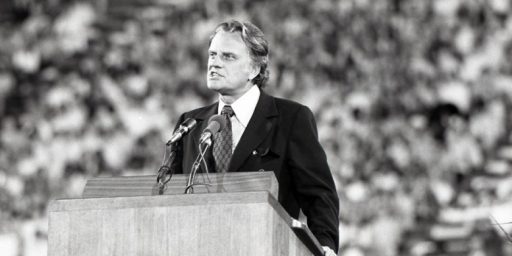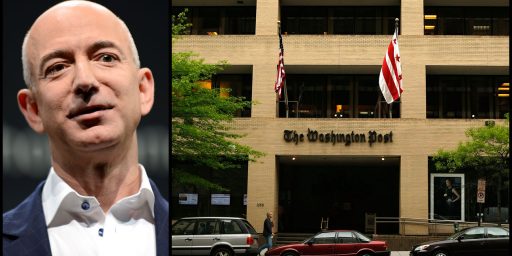Washington Post To Be Sold To Amazon Founder Jeff Bezos
One of the nation's papers of record is changing owners for the first time in 80 years.
The Washington Post, one of the nation’s most prominent newspapers, is being sold to an icon of the high technology and internet world:
The Washington Post Co. has agreed to sell its flagship newspaper to Amazon.com founder and chief executive Jeffrey P. Bezos, ending the Graham family’s stewardship of one of America’s leading news organizations after four generations.
Bezos, whose entrepreneurship has made him one of the world’s richest men, will pay $250 million in cash for The Post and affiliated publications to the Washington Post Co., which owns the newspaper and other businesses.
Seattle-based Amazon will have no role in the purchase; Bezos himself will buy the news organization and become its sole owner when the sale is completed, probably within 60 days. The Post Co. will change to a new, still-undecided name and continue as a publicly traded company without The Post thereafter.
The deal represents a sudden and stunning turn of events for The Post, Washington’s leading newspaper for decades and a powerful force in shaping the nation’s politics and policy. Few people were aware that a sale was in the works for the paper, whose reporters have broken such stories as the Pentagon Papers, the Watergate scandals and disclosures about the National Security Administration’s surveillance program in May.
For much of the past decade, however, the paper has been unable to escape the financial turmoil that has engulfed newspapers and other “legacy” media organizations. The rise of the Internet and the epochal change from print to digital technology have created a massive wave of competition for traditional news companies, scattering readers and advertisers across a radically altered news and information landscape and triggering mergers, bankruptcies and consolidation among the owners of print and broadcasting properties.
“Every member of my family started out with the same emotion—shock—in even thinking about” selling The Post, said Donald Graham, the Post Co.’s chief executive, in an interview Monday. “But when the idea of a transaction with Jeff Bezos came up, it altered my feelings.”
Added Graham, “The Post could have survived under the company’s ownership and been profitable for the foreseeable future. But we wanted to do more than survive. I’m not saying this guarantees success but it gives us a much greater chance of success.”
The Washington Post Co.’s newspaper division, of which The Post newspaper is the most prominent part, has suffered a 44 percent decline in operating revenue over the past six years. Although the paper is one of the most popular news sources online, print circulation has dwindled, too, falling another 7 percent daily and Sundays during the first half of this year.
Ultimately, the paper’s financial challenges prompted the company’s board to consider a sale, a step once regarded as unthinkable by insiders and the Graham family itself.
With extraordinary secrecy, Graham hired the investment firm Allen & Co. to shop the paper, company executives said. Allen’s representatives spoke with a half-dozen potential suitors before the Post Co.’s board settled on Bezos, 49, a legendary tech innovator who has never operated a newspaper.
Bezos, in an interview, called The Post “an important institution” and expressed optimism about its future. “I don’t want to imply that I have a worked-out plan,” he said. “This will be uncharted terrain and it will require experimentation.”
He said, “There would be change with or without new ownership. But the key thing I hope people will take away from this is that the values of The Post do not need changing. The duty of the paper is to the readers, not the owners.”
Despite the end of the Graham family’s control of the newspaper after 80 years, Graham and Bezos said management and operations of the newspaper would continue without disruption after the sale.
Post publisher Katharine Weymouth—Graham’s niece and the fourth generation of her family involved in the newspaper—will remain as publisher and chief executive of the Bezos-owned Post; executive editor Martin Baron will continue in his job. No layoffs are contemplated as a result of the transaction among the paper’s 2,000 employees, who will be told of the sale at a company-wide meeting Monday afternoon.
Bezos said he would maintain his home in Seattle and would delegate the paper’s daily operations to its existing management. “I have a fantastic day job that I love,” he said.
In a note to Post employees on Monday, Weymouth wrote, “This is a day that my family and I never expected to come. The Washington Post Company is selling the newspaper that it has owned and nurtured for eight decades. “
Indeed, the Graham family’s involvement in the Post stretches back to the depths of the depression and a bankruptcy sale that rescued the paper from what was likely certain doom at the time:
The Post, founded in 1877, has been controlled since 1933 by the heirs of Eugene Meyer, a Wall Street financier and former Federal Reserve official. Meyer bought the paper for $825,000 at a bankruptcy auction during the depth of the Depression.
After years of financial struggle, Meyer and his successor as publisher of The Post, son-in-law Philip L. Graham, steered the paper into a leading position among Washington’s morning newspapers. They began enlarging the company, notably by acquiring TV stations and Newsweek magazine in 1963 (the company sold the magazine for a nominal fee to the late billionaire Sidney Harman in 2010 after years of losses). In later years, the company added cable TV systems and the Kaplan educational division, currently the company’s largest by revenue.
Upon Graham’s death in 1963, his widow (and Meyer’s daughter) Katharine Graham took over management of the company. Despite her inexperience as a corporate executive, Mrs. Graham ably led the company through a colorful and expansive period.
The newspaper rose to national stature under Benjamin C. Bradlee, whom Katharine Graham had hired from Newsweek in 1965 as a deputy managing editor and promoted to editor in 1968. Bradlee oversaw the opening of new reporting bureaus around the nation and the world, started the Style section, and ignited the paper’s long run of Pulitzer Prize-winning reporting.
The Post’s and New York Times’ publication in 1971 of stories based on the Pentagon Papers—a secret government study of American military and political involvement in Vietnam—led to a landmark legal case in which the Supreme Court prohibited the government from exercising “prior restraint,” or pre-publication censorship, against the newspapers.
The arrest of seven men accused of breaking into the Democratic National Committee’s headquarters at the Watergate office complex in 1972 triggered the newspaper’s unearthing of a series of illegal activities orchestrated by President Nixon and his closest advisers. The revelations eventually led to Nixon’s resignation. The events were memorialized by the movie “All the President’s Men,” which turned The Post—as well as Bradlee and reporters Bob Woodward and Carl Bernstein—into household names.
Seven years after Nixon’s resignation, however, the paper suffered one of its darkest hours. It was forced to give back a Pulitzer Prize awarded to reporter Janet Cooke in 1981 after she admitted that her story about an eight-year-old heroin addict in Washington named Jimmy was a fabrication.
Katharine Graham, who died in 2001, was succeeded as Post publisher by her son, Donald, in 1979. He also succeeded her as chief executive of the Washington Post Co. in 1991.
During the 1990s and into the new century, under Bradlee’s successor, Leonard Downie Jr., the paper enjoyed arguably its most successful run in terms of profits, circulation and journalism. With little direct competition, the newspaper division’s revenue and profit soared. The Post won 25 Pulitzers under Downie, including six in 2008, the year he retired and was succeeded by Marcus Brauchli as editor.
The Grahams are among the last of a dwindling number of multigenerational family owners of metropolitan newspapers. Most major newspapers were once owned by local families with decades-long ties to their town or city, but that ownership profile has faded with succeeding generations and has largely disappeared in the Internet era.
Many of the heirs to great newspaper fortunes have sold their holdings to corporations or wealthy investors with little connection to the regions that the newspapers helped shape or, in some instances lately, to local businesspeople whose wealth was more recently acquired.
Over the past 20 years, the list of family-owned companies that have sold their newspapers holdings include the Chandlers (owners of the Los Angeles Times, among others), Cowles (Minneapolis Star Tribune), Copleys (San Diego Union-Tribune), and Bancrofts (Wall Street Journal).
The New York Times, controlled by the Sulzberger family, is among the last major dailies still operated by descendants of its early proprietor. It acquired The Boston Globe from members of the Taylor family in 1993 for $1.1 billion; it announced last week it was selling the paper for a mere $70 million to Boston businessman John W. Henry, a businessman who owns the Boston Red Sox.
Unlike the sale of Newsweek, which itself used to be part of the Post Company’s holdings, there had been no inkling up until today that the Washington Post was on the market in any significant respect, and its interesting how the parties involved were able to keep the negotiations secret until now, especially considering the fact that the Post Company is a publicly traded company. Given the fact that members of the Graham family will continue to be involved in the management of the newspaper, and that the editorial and other staff will seemingly remain unchanged, it’s unlikely that we’ll see any significant changes at the Post, at least in the short term. However, it’s worth noting that Bezos is a businessman rather than a newspaperman so he’s likely to bring a very different perspective to many of the business realities facing the Post and other newspapers in an era where news delivery has shifted to the online world, seemingly for good. Given his background in the technology world, perhaps Bezos will be more inclined to continue the paper’s expansion in these areas. He’s also likely to be less inclined to hang on to certain aspects of the paper merely for the sake of “tradition.”
Inevitably, some will wonder what the political impact of this might be. Ownership can have a significant impact on the political direction of a newspaper, after all. One need only look to the changes that have occurred at the Wall Street Journal since its acquisition by News Corp. to see that, although the Journal has always been a generally conservative paper editorially in any cases. For his own part, Bezos’s most notable political actions of late have been his rather public support for initiatives to legalize same-sex marriage, most especially the initiative that passed in Washington state last November. According to one report, Bezos and his wife donated a total of $2.5 million in support of that initiative. In interviews, he has described his political views as “libertarian,” although Wikipedia notes that he has donated limited amounts of money to both Republican and Democratic candidates in recent years. What that means for the Post is unclear, because Bezos has never seemed like the type of person to use his businesses to advance political agendas, so it’s possible that he’ll feel the same way about this new business venture.
In any case, it’s still big news when one of the nation’s newspapers of influence changes ownership hands, and the fact that they buyer is someone like Bezos makes the transaction all the most intriguing. It will be interesting to see what he does with an entity that has been around for 136 years and which now faces a brave new world where print publications are, seemingly, slowly fading away.
Update: One point I didn’t address in the post originally is the purchase price. Bezos is buying the Post for $250 million. That’s an interesting number, especially in light of the fact that, just a couple days ago, The Boston Globe was sold for a mere $70 million dollars. Granted, the Post is a far more prominent newspaper than the the Globe and has a far higher circulation (the Post has roughly 475,000 readers for its weekday print edition and 838,000 for its Sunday print edition while the Globe has about half that number on weekdays and 1/4 the Post’s Sunday circulation.) I’d also venture a guess that daily web traffic for the Post’s website exceeds that of the Globe rather significantly. Still, a quarter billion dollars for a paper that has been losing money and subscribers for several years now is a huge investment risk on Bezos’s part, it would seem.







He is far from a normal businessman.,,,he’s a fair-haired boy who made good. Bravo for buying a newspaper without knowing much about the business (kind of like Warren Buffet purchasing Burlington Northern-Santa Fe). Who knows what will happen? Bravo! “you’ve seen ‘All the President’s men..now buy the newspaper!”
First the Globe…now this…maybe the biggest week in print journalism ever?
Well, this will leave the Grahams with time to do what they do best – using corporate welfare in the form of federal student loans to sell degrees and certificates through their Kaplan diploma mills to unsophisticated adults who don’t understand the term “nondischargable debt.”
That´s a trend. French daily Le Monde was bought by Xavier Niel, a tech billionaire, and a group of investors.
The Washington Post is now a rich man’s toy. They used to buy yachts and race horses.
Hmmm, I wonder if I’ll eventually be able to get a subscription to the Washington Post as part of my Amazon Prime membership? 😀
Well, if I want to know more about this, I’ll wait for tomorrow’s paper, or next week’s Newsweek. Wait a second, what’s this thing I’m typing on? Is it possible that it could get me information faster? I should check this out.
“…and its interesting how the parties involved were able to keep the negotiations secret until now, especially considering the fact that the Post Company is a publicly traded company.”
Nah. Dual share structure. Class A stock has super voting rights. The Class B shareholders can not veto any deal.
I expect Bezos is using WaPo to build up his content base, and the speculation that it will be available to Amazon Prime members isn’t far fetched at all.
Until I saw the picture at the top of the Original Post and looked into the ‘other’ flag, I didn’t realize the the District of Columbia had a flag. Actually learned something from a post by Our Gracious Host.
…Thank God it is not Murdoch or the Kochs.
Hmmm…I think 250 million is a low valuation, given the strength of the brand, its clout and circulation.
As one wag puts it: ‘You makes yer money on the buy, not the sell.’
Since Xavier Niel, an investment banker and a industrialist bought the Le Monde, their content improved a lot. Really a lot. More reporting, and they created a news souce for the information age, not a print newspaper that also has a website.
There is hope that Bezos can improve the WP: get rid of their neocons in the opinion page, improve their online services and improve their reporting of politics and world affairs.
@DC Loser:
That does not make sense. Slate and theroot were not part of the deal. Begs is just buying the newspapers and the question comes back of how that the new media afford to send people out to cover actual events and then offer free access to the stories.
@michael reynolds: Apparently there were no major league sports teams available. You might have thought he might be interested in bringing the NBA back to Seattle.
Doug: “Inevitably, some will wonder what the political impact of this might be. Ownership can have a significant impact on the political direction of a newspaper, after all.”
Somebody buying the biggest (and money-losing) newspaper in the Imperial Capitol is doing it for politics.
@John Peabody: Funny, the quality of the Richmond Times-Dispatch has improved dramatically since Buffet bought it from Media General and has been leading newspaper writing dozens of stories about Governor McDonnell’s corruption.
I did not know that he is a fossil enthusiast.